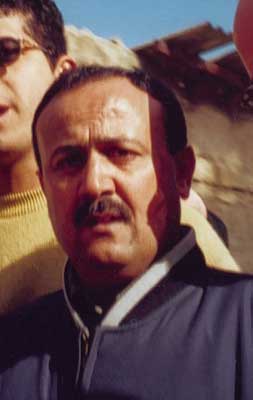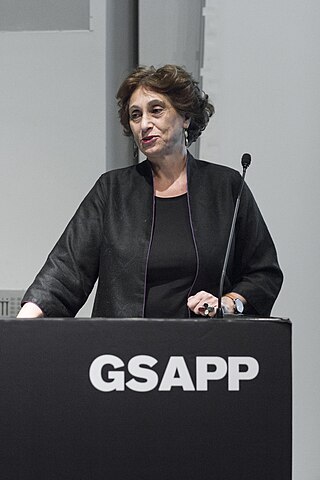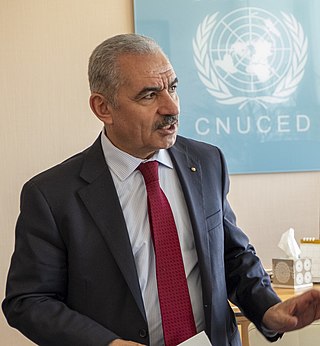Related Research Articles

Marwan Hasib Ibrahim Barghouti is a Palestinian political figure convicted and imprisoned for murder by an Israeli court. He is regarded as a leader of the First and Second Intifadas. Barghouti at one time supported the peace process, but later became disillusioned, and after 2000 went on to become a leader of the Second Intifada from the West Bank. Barghouti was a leader of Tanzim, a paramilitary offshoot of Fatah.

Sari Nusseibeh is a Palestinian professor of philosophy and former president of the Al-Quds University in Jerusalem. Until December 2002, he was the representative of the Palestinian National Authority in that city. In 2008, in an open online poll, Nusseibeh was voted the 24th most influential intellectual in the world on the list of Top 100 Public Intellectuals by Prospect Magazine (UK) and Foreign Policy.
The Palestinian NGOs Network (PNGON) is a non-profit, non-governmental organization with a mandate to protect the environment of Palestine by acting as a coordinating body for Palestinian environmental organizations located in the West Bank and Gaza Strip. PNGON was initiated after the 2000 al-Aqsa Intifada due to heightened demands for Palestinian environmental organizations to defend the Palestinian environment.

Suad Amiry is a Palestinian author and architect living in the West Bank city of Ramallah.
Ibrahim Abu-Lughod was a Palestinian academic, characterised by Edward Said as "Palestine's foremost academic and intellectual" and by Rashid Khalidi as one of the first Arab-American scholars to have a really serious effect on the way the Middle East is portrayed in political science and in America". His student Deborah J. Gerner wrote that he "took on the challenge of interpreting U.S. politics and society for the Palestinian community as well as eloquently articulating Palestinian aspirations to the rest of the world."

Sliman Mansour, is a Palestinian painter, sculptor, author and cartoonist, considered an leading figure among contemporary Palestinian artists. Mansour is considered an artist of intifada whose work captures to the cultural concept of sumud. His paintings, which have been exhibited around the world reflect the Palestinian struggle and include images of women in Palestinian traditional costumes and Levantine tree-filled landscapes. In 1987 he was part of the New Visions collective that boycotted Israeli supplies and instead used local natural Palestinian materials.

The following outline is provided as an overview of and topical guide to the State of Palestine:
Nur ad-Din Masalha commonly known in English as Nur Masalha is a Palestinian writer, historian, and academic.

Ali Jarbawi is the former Minister of Planning and Administrative Development and the former Minister of Higher Education of the Government of the Palestinian National Authority.
Events in the year 2002 in Israel.
Salim Tamari, is a Palestinian sociologist who is the director of the Institute of Palestine Studies and an adjunct professor at the Center for Contemporary Arab Studies at Georgetown University. Rashid Khalidi, the Edward Said Professor of Modern Arab Studies at Columbia University, has called Tamari "the preeminent Palestinian historical sociologist."

Al-Manara Square is a town square located in Ramallah, West Bank, Palestine. It has been called "one of Palestine’s renowned public spaces."

Mustafa Barghouti is a Palestinian physician, activist, and politician who serves as General Secretary of the Palestinian National Initiative (PNI), also known as al Mubadara. He has been a member of the Palestinian Legislative Council since 2006 and is also a member of the Palestine Liberation Organization (PLO) Central Council. In 2007, Barghouti was Minister of Information in the Palestinian unity government.
Lisa Taraki is an Afghan-born Palestinian journalist, teacher and sociologist. She is an associate professor of sociology at Birzeit University in the West Bank and former Dean of its graduate students. She is the co-founder of the university's Institute of Women's Studies and founding Director of the doctoral program in social sciences. Taraki is also the co-founder of the Palestinian Campaign for the Academic and Cultural Boycott of Israel (PACBI), a campaign that spearheaded the BDS movement and advocates for academic and cultural boycotts of Israel until it stops what they see as violations of the Palestinians' human rights. She has also served as the director of the board of trustees for Al Haq.

Mohammad Ibrahim Shtayyeh is a Palestinian politician, academic, and economist who has been Prime Minister of the State of Palestine since March 2019.

Osama Silwadi is a Palestinian photojournalist, visual storyteller, archivist and folklorist. He started his professional career in 1991. During the first Palestinian Intifada, he faced difficulties and challenges and was in danger as he worked in the conflict areas. In October 2006, Osama was seriously injured by a stray bullet during a march in the center of Ramallah, which resulted in paralysis of the lower limbs. Silwadi has won titles inspired by his work in documenting the Palestinian heritage, including "The Eye of Palestine" and the "Palestinian Heritage documentor".

Husam Said Zomlot is a Palestinian diplomat, academic and economist. He was appointed Head of the Palestinian Mission to the United Kingdom in October 2018. Before his posting to the UK, he served as head of the PLO mission to the United States that was closed by President Donald Trump's administration.

Beer in the State of Palestine is manufactured by Palestinian microbreweries – most traditionally Taybeh Brewery, established in 1994, and Birzeit Brewery, since 2015. Several beer festivals are held annually in Palestine, including an Oktoberfest-style event hosted by the Taybeh Brewery.
TheNational Guidance Committee was a Palestinian political organization formed in response to the Camp David Accords between Egypt and Israel in the late 1970s.
This article is about the Jerusalem-based Arab Thought Forum ("Al-Multaqa"), not to be confused with the Amman-based Arab Thought Forum.
References
- ↑ "Israelis Warm To Shultz As Time Runs Out". The Miami News. June 9, 1988. p. 9A. Archived from the original on 12 February 2020. Retrieved 22 September 2011.
- 1 2 "Ibrahim Dakkak Remembered (1929-2016) - The Institute for Palestine Studies". www.palestine-studies.org. Retrieved 16 June 2017.
- 1 2 3 4 5 6 7 8 9 10 11 12 13 14 15 16 17 18 19 20 "Ibrahim Dakkak - Politicians (1929 - 2016)". Interactive Encyclopedia of the Palestine Question – palquest. Retrieved 2023-12-10.
- 1 2 3 4 5 6 Dakkak, Ibrahim; Tamari, Salim (2017). "INTERVIEW WITH IBRAHIM DAKKAK (1929–2016): A Life of Struggle for Palestinian Rights". Journal of Palestine Studies. 46 (2 (182)): 83–90. ISSN 0377-919X.
- 1 2 3 4 5 6 7 Fischbach, Michael R. "Dakkak, Ibrahim." In Mattar, Philip. Encyclopedia of the Palestinians (Revised Edition), Infobase Learning, 2005, 114.
- ↑ Dakkak, Ibrahim; Tamari, Salim (2017). "INTERVIEW WITH IBRAHIM DAKKAK (1929–2016): A Life of Struggle for Palestinian Rights". Journal of Palestine Studies. 46 (2 (182)): 83–90. ISSN 0377-919X.
- ↑ "Palestinian National Initiative (Al-Mubadara)". ECFR - Mapping Palestinian Politics. 2018-03-20. Retrieved 2023-12-10.
- ↑ "Ibrahim Dakkak Remembered (1929-2016)". Institute for Palestine Studies. Retrieved 2023-12-10.
- ↑ "The Palestinian Museum Digital Archive - أرشيف المتحف الفلسطيني الرقمي : External collection : The Ibrahim al-Dakkak Collection [0047]". palarchive.org. Retrieved 2023-12-10.
- ↑ "The Ibrahim Dakkak Award for Outstanding Essay on Jerusalem | Heinrich-Böll-Stiftung | Palestine and Jordan". ps.boell.org. Retrieved 2023-12-10.